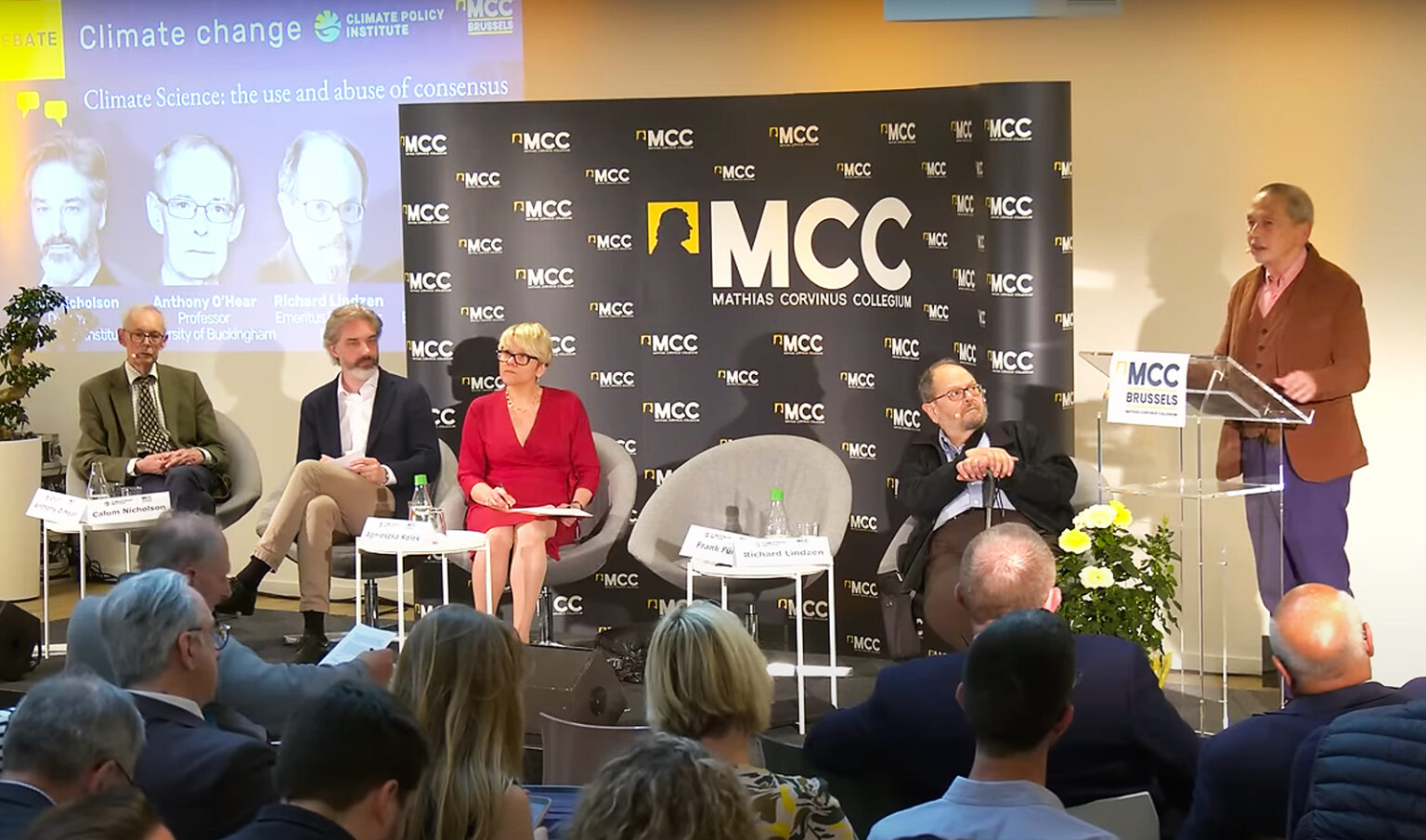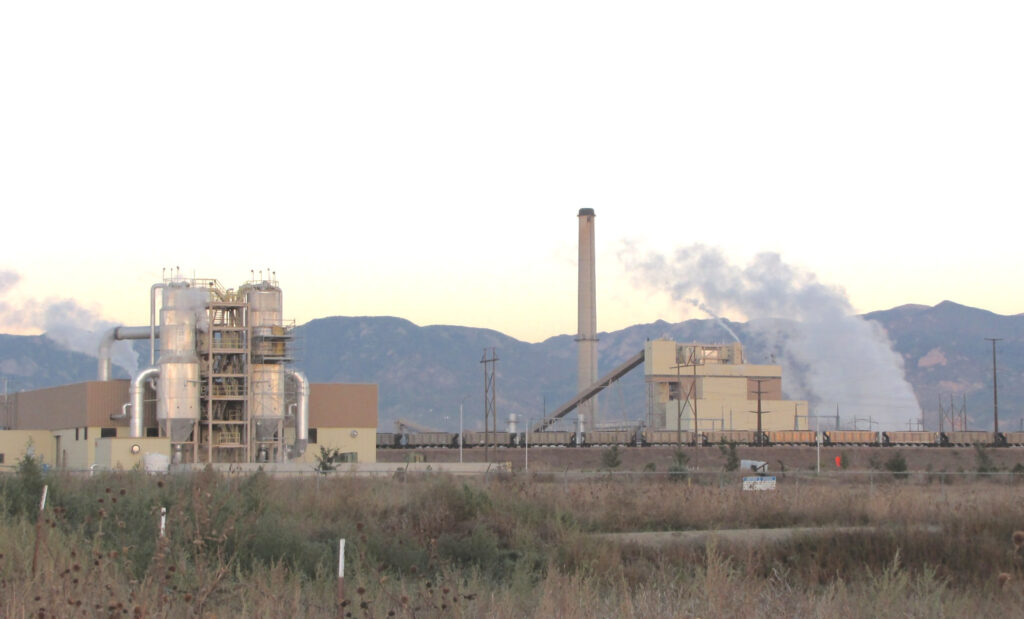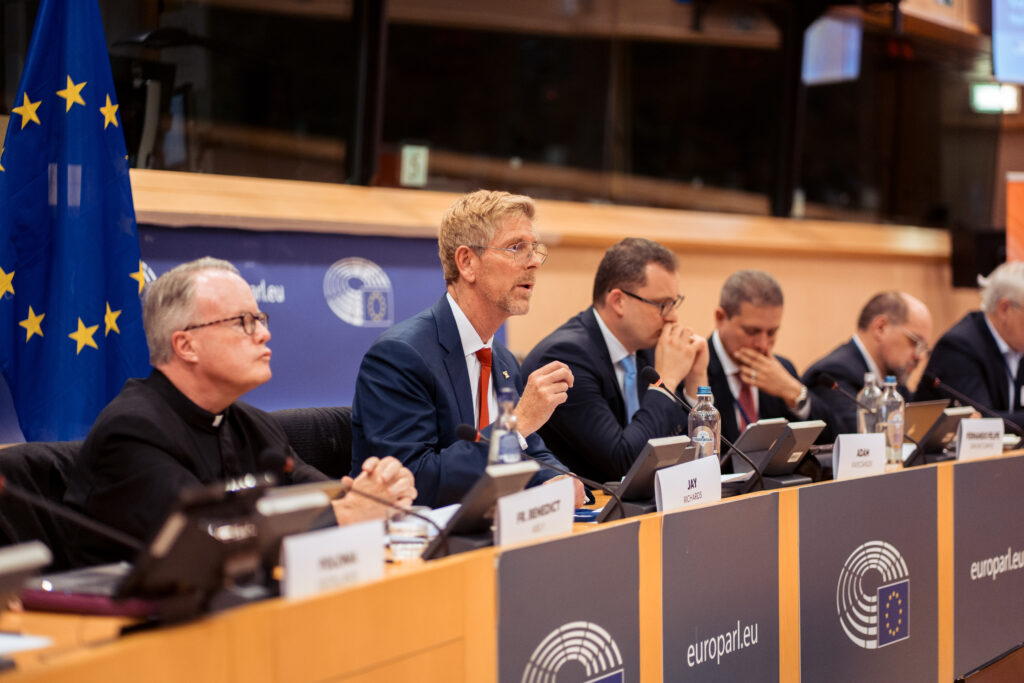A fossil fuel funded think tank with close ties to the Hungarian government hosted a meeting of climate science critics in Brussels last Thursday (23 May), to challenge the EU “consensus” on the environment.
Speakers from a range of anti-regulation groups shared their ideas two weeks before citizens across the bloc prepare to vote in elections from 6-9 June. Ahead of the vote, pollsters have predicted a surge in votes for far-right parties supporting an anti-environmental agenda.
Panellists from across Europe and the U.S. criticised climate science and action to limit greenhouse gas emissions, describing the EU’s net zero goal as “stupid propaganda” at the event organised by Mathias Corvinus Collegium (MCC) Brussels.
MCC Brussels is the European wing of MCC – a think tank funded by the Hungarian state via a 10 percent stake in the country’s oil and gas giant MOL.
The country’s autocratic, Eurosceptic leader Viktor Orbán said before Christmas that he wants to “take over Brussels”. Hungary is growing in influence in the EU, and is due to take on its presidency next month.
One of the speakers at the MCC Brussels event, Samuel Furfari, celebrated how populist, anti-green forces were now able to speak more freely in the EU.
“I need to congratulate the organisers because this is an exception in Brussels,” he said. “Finally, we are able to say something about the mess we have created.”
Furfari added that anti-green forces had been successful in stigmatising the EU’s emissions reduction targets. “In the present campaign, no one is discussing net zero,” he said. “Net zero is not a taboo, but nearly.”
Furfari is an adviser to the Global Warming Policy Foundation (GWPF), the UK’s leading climate science denial group. The GWPF has in the past expressed the view that carbon dioxide has been mis-characterised as pollution, when in fact it is a “benefit to the planet”.
Pascoe Sabido, a researcher and campaigner at Corporate Europe Observatory, said that the MCC Brussels event was an example of a “crude” and “extremely opportunistic” attempt to “weaken the case for climate action and increase oil and gas exploration”.
MCC Brussels executive director Frank Furedi told DeSmog that the think tank existed to encourage critical debate on a wide range of topics. Commenting on the funding sources of MCC Brussels, he said that he maintained “complete independence” over its output and agenda.
Furedi added that he would be “prepared to take money from the devil, because I think I’ve got enough integrity, that you know, I’m not going to play to their tune.”
MCC Brussels declined to comment further for this article.
Climate Science “Propaganda”
At the MCC Brussels event, a number of speakers cast doubt on the credibility of climate science and the findings of the UN’s Intergovernmental Panel on Climate Change (IPCC), the world’s leading climate science body.
Anthony O’Hear, a UK-based philosophy professor, referred to “so-called climate science” and claimed it was based on “rather questionable” modelling. He added that the state of scientific knowledge on climate change is “far more uncertain than is made out.”
O’Hear is a professor with the University of Buckingham, a private university which has links to libertarian groups that advocate against state-led climate action, including the Institute of Economic Affairs, a UK think tank that was funded by the oil major BP for at least 50 years.
Richard Lindzen, a GWPF adviser, former Massachusetts Institute of Technology (MIT) professor and ex-Cato Institute fellow, also downplayed the climate crisis. He said that scientific debates about the impacts of different temperature rises were “meaningless” and implied a rise in global temperatures of 1.5C would have negligible effects.
“People live in the Arctic, people live on the Equator. We’ve been able to manage radically different situations and that’s forgotten. When you talk about 1.5C being the change, you’re not exactly talking about a change from the poles to the tropics,” he said.
The world is now highly likely to breach 1.5C, and IPCC experts have warned that such an outcome will result in the heightened risk of dangerous climate tipping points leading to extreme temperatures, droughts, and flooding.
Lindzen also used a keynote speech at the beginning of the conference to argue that climate science was “propaganda” that had been devised by U.S. elites in the 1980s.
“The strategy of attacking scientists and science is old, and built upon experience of the tobacco industry,” said Timmons Roberts, professor of environmental studies at Brown University.
Roberts said that the details of the event and some of the claims shared were “gobsmacking”.
He said that “old talking points” were “being raised again as deniers and delayers see a window for rolling back the [climate] actions that have been put in motion in the EU.”
As well as casting doubt on climate science, speakers at the MCC Brussels event aimed their fire at policies enacted by the EU through its ‘Green Deal’.
Barbara Kolm, director of the Austrian Economics Center, told the audience: “I’m an environmentalist […] but on the other hand I also want to live in a prosperous world. I want to have all the advantages of innovation and I don’t want to go back to the dark ages and to the middle ages.”
Kolm criticised EU green measures including the RePowerEU plan – a policy aimed at making the bloc less dependent on Russian fossil fuels – as a “degrowth” strategy.
“Europe will become the Disneyland of the world, because no one will be here to work, to be productive,” she argued.
Lindzen claimed that climate policies would “impoverish the working middle class, condemn billions of the world’s poorest to increased poverty, leave our children despairing, and enrich our enemies who will enjoy our demise.”
Furfari similarly argued that the EU’s push to reach net zero emissions by 2050 is “stupid propaganda”. He suggested that the bloc’s net zero goal is a “dream that will destroy our economy, but is totally useless, because the rest of the world increases CO2 emissions.”
Academics have said that these arguments, which focus on the alleged costs of green measures and place responsibility for emissions reductions on others, are well-established ‘discourses of delay’ designed to discourage climate action.
Silvia Pastorelli, a climate campaigner with Greenpeace EU, told DeSmog: “Climate denial has become very fringe; not even fossil fuel companies do it openly anymore. Polluting companies, and the politicians aligned with them, try to instead delay necessary climate action by wrongly framing it as contrary to people’s wellbeing or financial security.”
Dieter Plehwe, a senior fellow at the Berlin Social Science Center, said that the narratives of climate science deniers were “like old songs subject to new cycles of revival”.
Lindzen defended his arguments – saying they were “obviously true” – when contacted by DeSmog. Furedi told DeSmog: “I take the view that probably what most scientists say is right.” However, he added that he was “a little bit sceptical, because I’m sceptical of everything”.
While panellists focused on the alleged costs of net zero measures, a study released in May estimated that, worldwide, the economic impacts of climate change will be six times what had previously been estimated, and could amount to 15 percent of GDP if the globe warms by little over 1.5C.
The EU’s climate service estimated that extreme weather events cost the bloc $2 billion in 2022, and impacted 156,000 people.
Pastorelli argued that “the cost of not tackling climate breakdown, or doing it too slowly, is many times higher than the cost of ending pollution” and would “hit the most vulnerable hardest.”
MCC Brussels communications director John O’Brien told DeSmog that the think tank existed to platform “discussion and debate,” a sentiment also expressed by Furedi in his introductory remarks.
MCC and MOL
MCC has vast resources by virtue of its ties to the Hungarian government.
MCC received more than £1.3 billion in Hungarian state funding in 2020, awarded a 10 percent stake in MOL, a 10 percent stake in the pharmaceutical firm Gedeon Richter, plus $462 million in cash and $9 million in property.
Through Gedeon Richter and MOL, the think tank was handed shares in two of the country’s three most valuable companies.
The New York Times reported in 2022 that MOL announced dividends of $652 million to be distributed among its shareholders, with $65 million going to MCC – comfortably more than its annual budget.
MCC is chaired by Balázs Orbán, who is Viktor Orbán’s political director. The think tank’s board also includes Hungary’s Minister of Culture and Innovation, János Csák. According to the investigative outlet Follow The Money, MCC is conservative, nationalist and Eurosceptic, and “plays a key role in spreading the ideology of the Hungarian government”.
Balázs Orbán has said: “It is our goal for Hungary to become an intellectual powerhouse, in which MCC plays a key role.”
Viktor Orbán has resisted EU measures to reduce emissions and cut off Russian fossil fuels following Vladimir Putin’s invasion of Ukraine in February 2022. Orbán has opposed an embargo of Russian oil, claiming it would devastate the Hungarian economy, and has only recently announced that the country will not renew its supply agreement with the Russian energy giant Gazprom. The deal will expire in January 2025.
MOL’s recent profits have been directly attributed to its access to cheap Russian oil and gas, while the firm’s CEO used an MCC event in 2023 to claim that sanctions against Russia had been ineffective.
The MCC Brussels event last week featured the Danube Institute, which has also received funding from the Hungarian government via the non-profit Batthyány Lajos Foundation (BLA).
The Danube Institute is “one of the main tools of the Orbán government’s ideological expansion abroad,” according to Hungarian journalists at Atlatszo. It has also been particularly active in North America, where it has a partnership with the Heritage Foundation, a think tank with a long record of casting doubt on the causes and severity of climate change.
Speaking to DeSmog after the event, Furedi said he wished for MCC Brussels to be judged on “what we do”, rather than the think tank’s funding sources.
The Danube Institute did not respond to DeSmog’s request for comment.
Farmers’ Protests
As revealed by DeSmog, MCC Brussels has been playing a role in mobilising protests against EU agricultural reforms aimed at reducing the sector’s emissions.
This theme also emerged during last week’s event, with panellists claiming that farmers’ protests across the bloc – which served as the catalyst for major EU environmental rollbacks – were evidence of a working class uprising against the Green Deal.
Others expressed optimism that, with far-right parties riding high in the polls ahead of the upcoming EU elections, the tide is turning against environmental action.
Johan Gardebo, a research fellow at the University of Cambridge, argued at the event that the “farmers’ protests have shown that net zero does not work for ordinary working people.”
Lindzen also said that farmers could act as an effective counter to the climate movement, which he characterised as being led by elites.
Investigations have shown that the farming sector’s most powerful and vocal unions often represent big business interests, which control disproportionate amounts of EU farmland, over the interests of smaller operations.
Political actors have also been accused of exploiting the concerns of farmers for their own populist campaigns.
MCC Brussels helped to organise protests in January, and facilitated a discussion among farmers’ groups this month ahead of a protest expected from far-right aligned agricultural interests on 4 June.
Gardebo, who also called net zero a “nightmare”, disputed that these groups represented the far-right, arguing that their actions were in response to the “extreme centre” of the EU’s “managerial class”.
Sabido of Corporate Europe Observatory said that the next European Parliament will be “extremely dangerous for the climate”, due to the rise of far-right parties and the willingness of centre-right politicians to follow their agenda.
‘‘We can expect a massive roll-back on climate and other measures seen as green,” he said.
Roberts of Brown University said that he hoped the vote would galvanise voters to “keep this flat-earthism in obscure corners in Brussels, rather than in the parliament or commission.”
Subscribe to our newsletter
Stay up to date with DeSmog news and alerts






